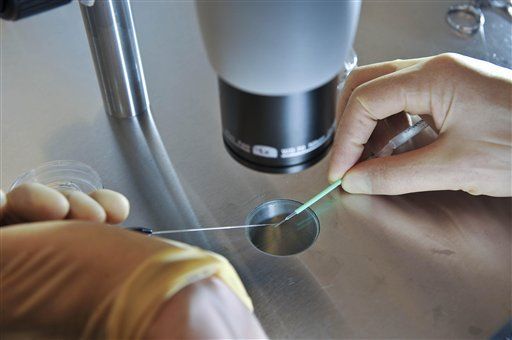PHOENIX — The House passed legislation Wednesday that would dictate to judges what should happen to frozen embryos when couples get divorced.
The measure approved on a 33-25 party line vote by the Republican-controlled House spells out that any dispute between divorcing spouses about the embryos must be resolved by giving them to whichever person promises to allow them to be born. SB 1393 would overrule any contract the couple had signed about what happens to them when they first decided to have the embryos frozen.
What that means is a man’s decision to no longer be a parent could be overridden if his ex-wife wants to become a mother.
But what it also means is that a woman could wind up having no say as her former husband gives the frozen embryos to a new spouse who would give birth to a child who is biologically related to her.
The measure, which already has been approved by the Senate, now goes to Gov. Doug Ducey.
Rep. Eddie Farnsworth, R-Gilbert, defended the decision to have the state step in. In fact, he said, Maricopa County Superior Court Judge Ronee Korbin Steiner effectively asked lawmakers to do just that.
In that case, Ruby Torres and her then-fiance agreed to in vitro fertilization. The idea was to implant the fertilized eggs after her cancer treatment.
During divorce proceedings, Torres presumed the embryos would be treated as property and divided up. But a judge, citing objections from her husband — and the language of a contract they had signed at the time of the medical procedure — concluded the embryos had to be donated to a third party.
“The court reminds the party it is not the job of the judiciary to make law,” Farnsworth quoted from the judge’s ruling. “The Legislature could act. But it has not done so.”
This bill, he said, fills that gap.
Rep. Kirsten Engel, D-Tucson, said the big problem with this legislation is it overrules a contract the couple had previously signed.
“The Legislature is actually directing the court to throw out that agreement and to allocate the embryos according to the decision tree in this bill,” she said.
“It seems to be government intruding upon a very, very private medical decisions of these couples,” Engel said. “It just seems to be wrong.”
Farnsworth pointed out that nothing in this legislation affects what happens in cases when a couple is still married.
Instead, he said, it would only kick in when there is a divorce proceeding. And Farnsworth said it’s precisely the role of courts to make such decisions in these cases, whether it’s a bank account or embryos.
“These embryos are treated as property, just like every other property,” he said.
Farnsworth did acknowledge the legislation does not treat these embryos like furniture or bank accounts, where a judge might decide the best course of action is to divide up the property equally.
He told colleagues it was clearly the intent of the parents, at least when they were getting along, to freeze embryos with the specific intent of having children at some point.
“That’s what this bill is trying to address, that we will keep that intent intact,” Farnsworth said, with the judge deciding who is most likely to fulfill that original intent by making sure the embryos are implanted in someone who will bring them to life.






